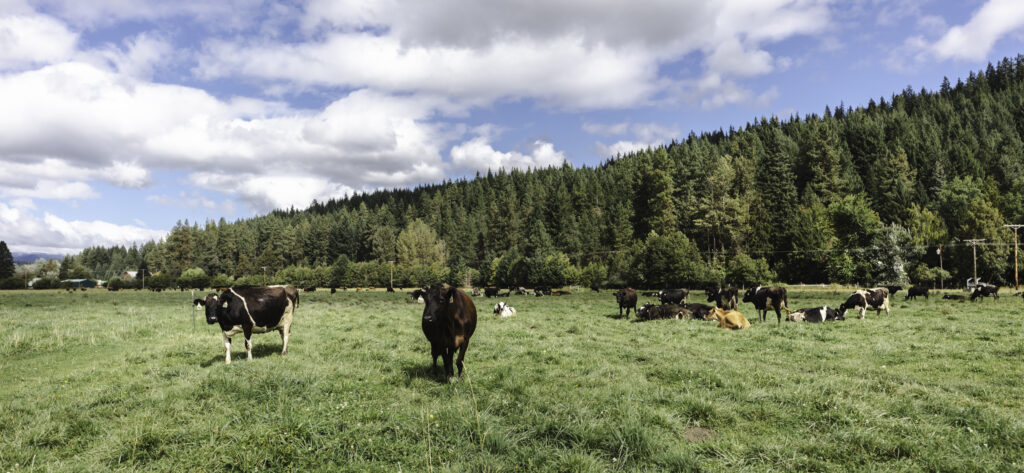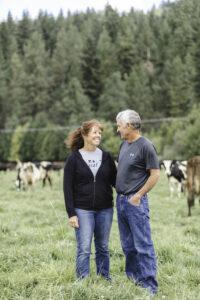Farmland for the Future
Two new Washington state programs accelerate farmland conservation

Farmland in the Pacific Northwest, and across the United States, is being lost at an alarming rate. According to a report from the American Farmland Trust, nearly 100,000 acres of farmland were converted to urban and low-density residential development in Washington between 2001 and 2016, and more than half of the land lost was considered the state’s best quality farmland. Additionally, the state’s remaining farmland faces an uncertain future. According to the 2017 Census of Agriculture, 34.8% of Washington’s farmers are over the age of 65, while only 6.5% are under the age of 35, meaning that aging farmers outnumber new farmers by a factor of 5:1.
Fortunately, land trusts are well-positioned to help protect the farms that feed our region. According to the Washington Association of Land Trusts (WALT) , land trusts in Washington have already permanently protected more than 22,000 acres of farmland, primarily through purchase of conservation easements that extinguish development rights.
A challenge that land trusts often encounter when using this tool, however, is the historically slow pace of funding availability compared to the fast timeline on which farmland is sold. “Despite strong land-use planning, Washington State has been losing farmland to development at high rates. We knew that land trusts could make an even bigger difference if they were able to act faster, as with existing models it can take two to six years to protect a single farm,” writes WALT in their annual report.
Following the advocacy of WALT, Washington Farmland Trust, and American Farmland Trust, two Washington state agencies launched programs to address these challenges to the future of farming, and this August Columbia Land Trust completed the first farmland conservation project in the state utilizing both new programs! Working with the Schmid family of Trout Lake, Washington, the Land Trust conserved 40 acres of rich and productive dairy pasture at the base of Mt. Adams in Klickitat County.
Together, the new programs enable a conservation strategy commonly called Buy-Protect-Sell in which land trusts purchase a farm, place a conservation easement on it, and then sell it at a reduced price. The first of the new programs enabling this strategy, the Farmland Protection and Affordability Investment program (FarmPAI), launched in 2021 and is administered by the Washington State Housing Finance Commission. FarmPAI is designed to assist conservation entities in purchasing important at-risk farmland within a matter of weeks. The second program, the Washington State Conservation Commission’s Farmland Protection and Land Access program (FPLA), is designed to work in tandem with FarmPAI by providing grant funding that makes it possible for eligible conservation organizations to purchase conservation easements to keep land in production, while also lowering barriers to land access for beginning or historically underserved farmers and ranchers. The grant funding to purchase the conservation easement allows partners to preserve the farmland by removing the development rights and repays a portion of the FarmPAI loan. The land is then sold to a different farmer at a more affordable price due to the extinguishment of its development rights, and funds from that sale repay the rest of the loan. FarmPAI is a revolving loan program so as outstanding loans are repaid, funds can go on to help protect the next farm.
“The Columbia Land Trust Schmid family project accomplished two major things: permanently protecting important farmland that provides dairy products to the region and facilitating a transition to the next generation of farmers,” said Kate Delavan, the Washington Conservation Commission’s Office of Farmland Preservation Coordinator. “There are currently two additional projects under contract for FPLA funding, that would conserve 237 acres in three Washington counties when combined with this project.”
“FarmPAI and FPLA were designed to help land trusts quickly and creatively conserve high-quality farmland. The Schmid Farm is an excellent example of this and we are thrilled to support the next generation of farmers,” said Dan Schilling, Senior Bond/Housing Credit Analyst at the Washington State Housing Finance Commission.

Lesli and Robert Schmid
The 40-acre project permanently protected productive agricultural land that has been part of the Schmid family’s dairy farm for decades. “Trout Lake Valley is a great place for pasturing dairy cows,” said Robert Schmid. “Cool air comes off Mt. Adams, there is an abundant water supply, and even though the growing season is short we can grow an unbelievable amount of grass.”
Robert and his wife Lesli both come from families with decades of farming history here, and their partnership with Columbia Land Trust and this 40-acre easement helped their family during a difficult economic time. “Running a dairy is a tough business and hay prices doubled during the pandemic,” explained Robert. “I’ve been farming for 45 years and had never seen anything like it. It happened so quickly, but this conservation easement saved us. It helped us ride out a tough time financially.”
In addition to easing financial pressure on the farm, the project also enabled the simultaneous benefit of facilitating a generational shift in ownership of the farm to the next generation of farmers, their two sons Aaron and Peter, which helps secure its long-term future. That’s because the FarmPAI and FPLA programs were designed to support historically underserved farmers: military veterans, people of color, and farmers that are early in their career.
“American Farmland Trust’s Farms Under Threat: The State of the States report identifies that one of the top actions states can take to prevent farmland loss is to actively facilitate the transfer of land to a new generation of producers,” said Addie Candib, American Farmland Trust’s Pacific Northwest Regional Director. “With these two innovative programs that leverage inter-agency collaboration, Washington stands to be an example for other states. Columbia Land Trust’s Schmid Farm project demonstrates that these programs are delivering real, lasting impacts for Washington’s farmland and farmers.”
Similar to scenes playing out in many farming communities, the cost of land in the Trout Lake area has increased substantially. “Trout Lake is a special place and its farmland is facing significant conversion pressure,” said Land Trust Conservation Lead Nate Ulrich.
Robert’s mother Esther was a long-time advocate for conserving farm ground. “She was determined to do it by any means available,” Robert said. “These land easements helped us move forward, generating liquid capital we could use immediately to continue operating.”
“The mountain is both a blessing and a challenge,” he said. “It’s the reason we love living here, and the reason others want to be here too. We love hiking, backpacking, skiing…the same activities that draw everyone here, but we’ve known for a long time that farmland would not always be affordable in Trout Lake.”
Transitioning to an organic dairy farm has helped the Schmids differentiate their product and compete with much larger mega dairies. The Schmid farm has been officially organic since 1996, although they implemented many key organic farming practices well before that. They were the first farm to work with the Organic Valley brand on the West Coast. Today they distribute through Darigold Organic and their organic milk can be purchased affordably at Costco under the Kirkland Signature label. The Schmids don’t use antibiotics, herbicides, pesticides, or commercial fertilizers on their farm, practices which also benefit the downstream White Salmon River watershed.
This was the second project Columbia Land Trust completed with the Schmid family, after conserving 215 acres in another area of their farm in 2012. “It has been great working with the Land Trust,” said Robert. “We really enjoy the people and the strong relationships we’ve built over many years. We would love to someday have our entire farm protected by conservation easements.”
We hope that this project will be the first of many agricultural conservation projects to be completed in Washington utilizing the new conservation programs, and we are excited for Aaron and Peter Schmid to take over farm ownership and continue to provide high quality local dairy products to our region.
Photos by Paloma Ayala